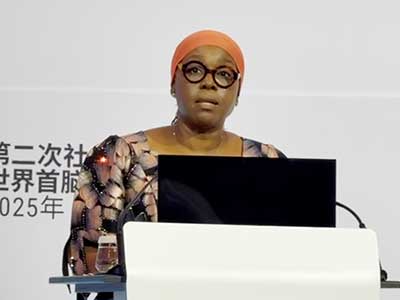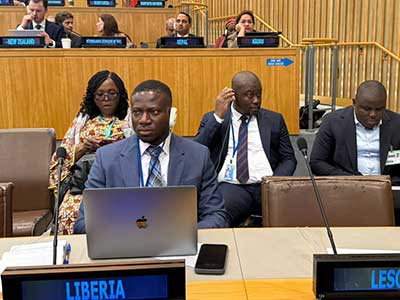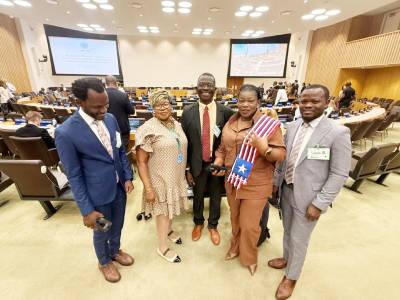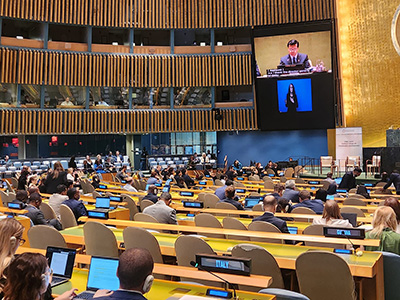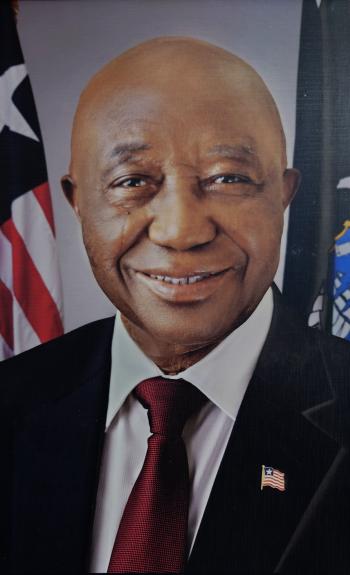Mr. president, I thank you for convening this very important meeting, which creates the platform to review progress and share perspectives on the implementation of the “Declaration of Commitment on HIV and AIDS and the Political Declaration on HIV and AIDS: Ending inequalities and getting on track to end AIDS by 2030”.
My delegation takes note of the report of the Secretary-General and hails the progress made in addressing HIV/AIDS, especially in the most affected regions, including Sub-Saharan Africa and the Caribbean. However, it is concerning that HIV infections and AIDS-related deaths are not declining fast enough to end the pandemic by 2030. With 8 years to go, the fact that more than 13,000 people still die weekly because of HIV/AIDS, makes it imperative for all of us to take urgent actions against the challenges that are slowing progress towards global targets.
In this regard, Mr. President, allow me to share efforts by the Government of Liberia to implement the Declaration of Commitment and the Political Declaration on HIV and AIDS.
Liberia’s approach to addressing the HIV/AIDS pandemic is characterized by persistent efforts in strengthening collaboration with local and international partners, research, and assessments to determine the trend of the pandemic and explore ways to mobilize resources domestically. Strategically, emphasis has been placed on interventions for key population groups.
Under the stewardship of the National AIDS Commission, Liberia continues to make steady progress in its commitments; in terms of reducing new HIV infections and AIDS-related deaths, reducing mother to child transmission; and increasing access to Anti- Retroviral Treatment (ART).
A SPECTRUM 2020 assessment estimates that 35,000 persons are living with HIV in Liberia; annual new infections are 1,400; while annual AIDS related deaths stand at 1,300; 85 percent of pregnant women needing anti-retroviral treatment (ART) are on treatment. The availability of Prevention of Mother to Child Transmission (PMTCT) centers across the country offering counseling and testing to pregnant women has greatly contributed to this result.
Mr. President, Excellencies,
Primary HIV prevention remains a central component of Liberia’s AIDS response strategy. Liberia has scaled up HIV combination prevention for both the general and key populations, with PrEP now been rolled out nationwide. We’ve updated HIV testing guidelines to including Index testing and self-testing. We have also updated treatment protocol to include Multi Months Dispensing (MMD) and Differentiated Drug Dispensing (DDD).
Building on these successes, Liberia, in 2021 joined the Global Partnership for Action to Eliminate All Forms of HIV related Stigma and Discrimination, developed and launched its Zero Discrimination Action Plan with the aim of accelerating the implementation of commitments made to end HIV related stigma and discrimination. The plan focuses on six priority areas: health, household & community, legal & justice, education, workplace, and humanitarian settings.
To this end, and with support of partners, including UNAIDS, the Global Fund to Fight AIDS, UNDP, USAID and PEPFAR, Liberia is implementing the following:
- Assessment of the Legal Environmental to determine discriminatory laws and holding consultative meetings with strategic stakeholders, such as Legislators, Cabinet Ministers, Religious and Traditional Leaders
- Developing the necessary policies to ensure that persons living with HIV, Key and Vulnerable populations have access to justice and can challenge rights violations
- Ensuring zero denial of health services based on perceived or positive HIV status
- Reduction of incidences of Sexual and gender-based violence
- Consultative meetings with opinion Leaders on the issue of Stigma and Discrimination against persons living with HIV
Mr. President:
While we’ve made progress, challenges remain. Our Response efforts are impeded by inadequate funding; weak supply chain management system, and a struggle to retain People Living with HIV (PLWHIV) on care. Other challenges include, poverty, resulting in inadequate nutrition; not having prompt access to medical facilities due to long distances to travel.
Despite these challenges, the Government of Liberia remains resolute and committed to the Global effort to rid the world of this scourge by 2030. We encourage the consistent galvanization of financial resources and partnerships to bolster efforts in achieving our global objective.
I thank you for your kind attention.

